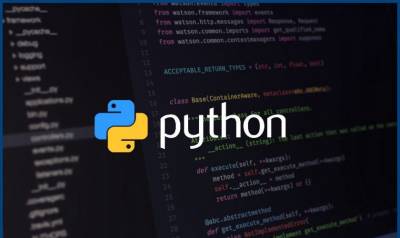This is an old revision of the document!
Table of Contents
Beginning python and advanced python courses by the training company.
Course One: Beginning Python
Course Overview:
This course is designed for beginners who have little to no experience with programming. Through hands-on exercises and practical examples, students will learn the fundamentals of Python programming language.
Class 1: Introduction to Python
- Overview of Python
- Installing Python
- Writing and executing a simple Python program
- Understanding variables and data types
Class 2: Control Flow and Loops
- Conditional statements (if, elif, else)
- Loops (for loops, while loops)
- Practice exercises
Class 3: Lists and Tuples
- Understanding lists and tuples
- Accessing elements
- List manipulation
- Tuple immutability
Class 4: Dictionaries and Sets
- Introduction to dictionaries and sets
- Working with dictionary keys and values
- Set operations
Class 5: Functions
- Defining and calling functions
- Parameters and return values
- Scope of variables
Class 6: Modules and Packages
- Understanding modules and importing them
- Creating and using packages
- Exploring the Python Standard Library
Class 7: File Handling
- Reading from and writing to files
- Using context managers (with statement)
- Error handling with try-except blocks
Class 8: Introduction to Object-Oriented Programming (OOP)
- Basics of OOP
- Classes and objects
- Attributes and methods
Class 9: Inheritance and Polymorphism
- Extending classes using inheritance
- Method overriding
- Polymorphism in Python
Class 10: Exception Handling
- Handling exceptions in detail
- Custom exception classes
- Best practices for exception handling
Class 11: Introduction to Regular Expressions
- Overview of regular expressions
- Using regex in Python
- Pattern matching
Class 12: Debugging and Testing
- Debugging techniques
- Unit testing with unittest module
- Test-driven development (TDD)
Class 13: Introduction to Data Analysis with Pandas
- Overview of Pandas library
- Series and DataFrame objects
- Basic data manipulation
Class 14: Introduction to Data Visualization with Matplotlib
- Overview of Matplotlib library
- Creating basic plots
- Customizing plots
Class 15: Introduction to Web Scraping with BeautifulSoup
- Overview of web scraping
- Using BeautifulSoup for scraping
- Scraping a simple webpage
Class 16: Final Project
- Students will work on a small project to apply the knowledge gained throughout the course.
Course Fees ( For the course beginning python listed above ) :
PKR Rs 30,000
LTC 1.1968071394641624
NANO XN0 : 72.48828106122843
CNY : 772.80
USD 107.40
Payment methods accepted :
Cheque, cash, nano, LTC, bank transfer, payoneer, NayaPay.
Guarantee : If you are not satisfied by the course, then you can request your money back within 14 days of the time you started the course. The start time is of the start time of the first lecture, physical class, or online course.
You do not have to provide any reason for requesting the money back. Feedback is optional.
Any financial instrument, payment, transaction or bank charges required to collect and refund the money shall be deducted from the fees.
Course Two: Advanced Python
Prerequisite : Completion certificate from course 1
Course Overview:
This course is designed for students who are already familiar with the basics of Python programming. It covers advanced topics and techniques to enhance students' Python skills.
(Note: Topics assume familiarity with the basics covered in Course One)
Class 1: Advanced Data Structures
- Collections module
- Named tuples
- Default dictionaries
- Deque
Class 2: Functional Programming
- Lambda functions
- Map, filter, and reduce functions
- List comprehensions
Class 3: Decorators
- Understanding decorators
- Creating and using decorators
- Decorator applications
Class 4: Generators and Iterators
- Understanding iterators and iterables
- Generator functions
- Generator expressions
Class 5: Context Managers
- Using the `with` statement in detail
- Creating context managers using contextlib module
- Application in file handling and resource management
Class 6: Concurrency with Threading
- Overview of threading
- Thread creation and management
- Synchronization and race conditions
Class 7: Concurrency with Multiprocessing
- Introduction to multiprocessing
- Process creation and management
- Communication between processes
Class 8: Asynchronous Programming with Asyncio
- Understanding asynchronous programming
- Async/await syntax
- Working with asyncio module
Class 9: Design Patterns
- Overview of design patterns
- Singleton, Factory, and Observer patterns in Python
Class 10: Functional Programming Patterns
- Currying
- Partial functions
- Memoization
Class 11: Metaprogramming
- Understanding metaprogramming
- Using metaclasses
- Dynamic attribute and method creation
Class 12: Pythonic Code
- Writing clean and Pythonic code
- PEP 8 guidelines
- Code optimization techniques
Class 13: Advanced File Handling
- Working with binary files
- Serializing Python objects
- Working with CSV and JSON files
Class 14: Database Interaction with SQLAlchemy
- Overview of SQLAlchemy
- ORM concepts
- CRUD operations
Class 15: Web Development with Flask
- Introduction to Flask framework
- Creating web applications
- Routing and views
Class 16: Final Project
- Students will work on an advanced project to demonstrate their understanding of the advanced Python concepts covered in the course.
Python Level 1
This course is designed for individuals with little to no programming experience who want to learn Python, a versatile and beginner-friendly programming language. Through a combination of lectures, hands-on exercises, and projects, students will gain a solid understanding of Python syntax, data structures, control flow, functions, and basic concepts of object-oriented programming.
Course Outline:
Week 1: Introduction to Python
Week 2: Data Types and Operators
Week 3: Control Flow
- Using logical operators with conditionals
- Looping constructs: while loop, for loop
- Iterating over sequences (lists, strings, tuples)
- Using break and continue statements
Week 4: Data Structures Part I
- Lists: creation, indexing, slicing, appending, and extending
- List methods and operations
- Tuples: creation, accessing elements, immutability
- Sets: creation, operations, and methods
- Using list comprehensions
Week 5: Data Structures Part II
- Dictionaries: creation, accessing elements, dictionary methods
- Nested data structures
- Combining data structures for complex data organization
- Introduction to mutability and immutability
Week 6: Functions
- Defining and calling functions
- Function parameters and arguments
- Return statements and returning values
- Scope of variables: global vs local
- Unordered List Item
- Recursion: concept and examples
Week 7: Introduction to Object-Oriented Programming (OOP)
- Unordered List Item
- Understanding objects and classes
- Defining classes and creating objects
- Class attributes and methods
- Instance attributes and methods
- Inheritance and polymorphism basics
Week 8: File Handling and Modules
- Opening, reading, writing, and closing files
- File modes and file objects
- Working with different file formats (text files, CSV, JSON)
- Creating and using modules
- Importing modules and packages
Week 9: Error Handling and Debugging
- Understanding exceptions and errors
- Using try-except blocks for error handling
- Raising exceptions
- Debugging techniques and tools
- Best practices for writing clean and debuggable code
Week 10: Final Project
- Applying learned concepts to a real-world project
- Planning, designing, and implementing a Python application
- Presenting and sharing final projects with peers
- Reflection and feedback on the course
Topics for training
4 classes of 3 hours each.
Python Intro
Python Get Started
Python Syntax
Python Comments
Python Variables
Python Data Types
Python Numbers
Python Casting
Python Strings
Python Booleans
Python Operators
Python Lists
Python Tuples
Python Sets
Python Dictionaries
Python If…Else
Python While Loops
Python For Loops
Python Functions
Python Lambda
Python Arrays
Python Classes/Objects
Python Inheritance
Python Iterators
Python Scope
Python Modules
Python Dates
Python Math
Python JSON
Python RegEx
Python PIP
Python Try…Except
Python User Input
Python String Formatting
File Handling
Python File Handling
Python Read Files
Python Write/Create Files
Python Delete Files
Computer usage knowledge :
How to use the desktop.
How to use a terminal.
How to use a text editor.
How to run commands on the command line.
Prerequisites :
Linux Desktop with python installed.
Recommended distribution : MX Linux https://mxlinux.org/
Download AHS from https://sourceforge.net/projects/mx-linux/files/Final/Xfce/MX-21.1_ahs_x64.iso/download
https://mxlinux.org/download-links/
To register for the course
Send a screenshot of the working python command in the terminal to register for the course.
Send fee payment.
The working python screenshot and fee payment is due by end of 22nd of July 2022 to be able to attend the course.
An open source machine learning framework that accelerates the path from research prototyping to production deployment.
Deep learning for humans.
Keras is an API designed for human beings, not machines. Keras follows best practices for reducing cognitive load: it offers consistent & simple APIs, it minimizes the number of user actions required for common use cases, and it provides clear & actionable error messages. It also has extensive documentation and developer guides.
TensorFlow is an end-to-end open source platform for machine learning. It has a comprehensive, flexible ecosystem of tools, libraries and community resources that lets researchers push the state-of-the-art in ML and developers easily build and deploy ML powered applications.
Python AI: How to Build a Neural Network & Make Predictions
A Comprehensive Guide To Artificial Intelligence With Python
CS50's Introduction to Artificial Intelligence with Python
Python for Data Science, AI & Development
Artificial Intelligence with Python
Role of Python in Artificial Intelligence (AI)
Topics for training
Based on https://www.w3schools.com/python/
4 classes of 3 hours each.
Starting python.
Python Intro
Python Get Started
Python Syntax
Python Comments
Python Variables
Python Data Types
Python Numbers
Python Casting
Python Strings
Python Booleans
Python Operators
Python Lists
Python Tuples
Python Sets
Python Dictionaries
Python If…Else
Python While Loops
Python For Loops
Python Functions
Python Lambda
Python Arrays
Python Classes/Objects
Python Inheritance
Python Iterators
Python Scope
Python Modules
Python Dates
Python Math
Python JSON
Python RegEx
Python PIP
Python Try…Except
Python User Input
Python String Formatting
File Handling
Python File Handling
Python Read Files
Python Write/Create Files
Python Delete Files
Topic 1 Introduction to Python Programming
Business requirements and objectives Applications of Python programming to meet business requirements Install Python and Setup Python IDE
Topic 2: Data Types and Operators
Data Types Operators
Topic 3 Problem Solving with Control Structures
Problem solving with conditional and loop techniques Coding using comprehensions
Topic 4 Scripting with Function and Lambda
Create Python functions to meet business use cases Lambda function and its applications
Topic 5 Import and Process Finance Data
Data analysis using Pandas package DataFrame and Series data structures Import finance data Filter and slice finance data Clean missing data
Topic 6 Aggregate and Visualize Finance Data
Join finance data with concat, append and merge Aggregate data with groupby and pivot table Assess codes to identify gaps Test and visualize finance data
Topic 7 Analyze Finance Data
Improve codes with pipe and apply Applications of statistics Analyse finance data to track any changes
Mode of Assessment
Written Assessment (Q&A) Practical Performance




